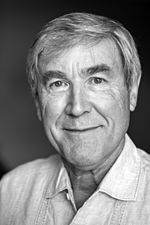Paul Davies
| Paul Davies | |
|---|---|

Davies in 2016
|
|
| Born | Paul Charles William Davies 22 April 1946 London, England |
| Nationality | British |
| Fields | Physicist |
| Institutions |
Arizona State University University of Cambridge University of Adelaide Macquarie University University of Newcastle |
| Alma mater | University College London |
| Thesis | Contributions to theoretical physics: (i) Radiation damping in the optical continuum; (ii) A quantum theory of Wheeler–Feynman electrodynamics (1970) |
| Doctoral advisor |
Michael J. Seaton Sigurd Zienau |
| Other academic advisors | Fred Hoyle (as a postdoc) |
| Doctoral students | Nicholas Birrell Edmund Copeland Kerry Hinton Don Koks Andrew Matacz Carol Oliver William Walker Andy Wright |
| Known for |
Fulling–Davies–Unruh effect Bunch–Davies vacuum state |
| Notable awards |
Templeton Prize (1995) Kelvin Medal (2001) Faraday Prize (2002) Klumpke-Roberts Award (2011) |
|
Website http://cosmos.asu.edu/ |
|
Paul Charles William Davies, AM (born 22 April 1946) is an English physicist, writer and broadcaster, a professor at Arizona State University as well as the Director of BEYOND: Center for Fundamental Concepts in Science. He is affiliated with the Institute for Quantum Studies at Chapman University in California. He has held previous academic appointments at the University of Cambridge, University College London, University of Newcastle upon Tyne, University of Adelaide and Macquarie University. His research interests are in the fields of cosmology, quantum field theory, and astrobiology. He has proposed that a one-way trip to Mars could be a viable option.
In 2005, he took up the chair of the SETI: Post-Detection Science and Technology Taskgroup of the International Academy of Astronautics. He is also an adviser to the Microbes Mind Forum.
Davies was brought up in Finchley, London. He attended Woodhouse Grammar School and then studied physics at University College London, gaining a first class Bachelor of Science degree in 1967.
In 1970, he completed his PhD under the supervision of Michael J. Seaton and Sigurd Zienau at University College London. He then carried out postdoctoral research under Fred Hoyle at the University of Cambridge.
...
Wikipedia
